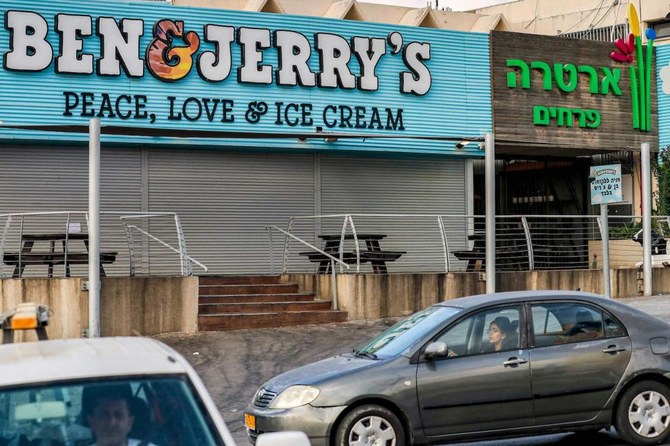LONDON: The Jewish co-founders of American ice cream-maker Ben & Jerry’s have given their “unequivocal” backing to the company over its “brave” decision to stop selling products in the occupied West Bank.
The move comes amid a backlash against the Vermont firm, with the Israeli government putting pressure on its parent company, Unilever, and the chair of the board of Ben & Jerry’s forced to deny accusations of antisemitism.
Bennett Cohen and Jerry Greenfield, who set up the company in 1978, wrote in an article for The New York Times: “We are the founders of Ben & Jerry’s. We are also proud Jews. It’s part of who we are and how we’ve identified ourselves for our whole lives. As our company began to expand internationally, Israel was one of our first overseas markets. We were then, and remain today, supporters of the State of Israel, but it’s possible to support Israel and oppose some of its policies, just as we’ve opposed policies of the US government.
“As such, we unequivocally support the decision of the company to end business in the occupied territories, which the international community, including the UN, has deemed an illegal occupation.”
The pair added that while they no longer controlled Ben & Jerry’s they believed it to be “on the right side” of history.
“Ending the sales of ice cream in the occupied territories is one of the most important decisions the company has made in its 43-year history.
“That we support the company’s decision is not a contradiction, nor is it antisemitic. In fact, we believe this act can and should be seen as advancing the concepts of justice and human rights, core tenets of Judaism,” they said, adding that it was important to note Ben & Jerry’s would continue to sell products inside Israel.
In a statement, the ice cream-maker said it had parted company with the Israeli firm responsible for manufacturing and distributing its products in the region, adding: “Although Ben & Jerry’s will no longer be sold in the OPT, we will stay in Israel through a different arrangement. We will share an update on this as soon as we’re ready.”
Unilever has said it is “fully committed” to doing business in Israel, despite heavy political pressure against the decision in the country and abroad.
Israeli Prime Minister Naftali Bennett vowed to “act aggressively” to reverse it, whilst Israel’s ambassador to the UN, Gilad Erdan, blamed the assembly for fostering an environment where Israel was condemned by the international community while others, such as Syria and Iran, faced less scrutiny.
“When this council fails to take strong action against the world’s worst human rights violators like Iran and Syria and instead singles out the world’s only Jewish state, it is no wonder that companies like Ben & Jerry’s and Unilever allow themselves to single out Israel for boycott,” he said.
On Wednesday, 90 of the 120 members of the Knesset signed a letter addressed to Ben & Jerry’s calling on it to reverse its “shameful, immoral and regrettable” move, adding that it could be in violation of Israeli law.
The Israeli government also wrote to 35 US states with anti-boycott laws asking them to consider action against Ben & Jerry’s, while in New York City, a Jewish owner of a Ben & Jerry’s store pledged to donate 10 percent of all his profits to Israel.
“We couldn’t sit back and watch without speaking up,” Joel Gasman, the store owner, said. “(The company’s decision) has definitely hurt our bottom line and our overall store value. We did fear boycotts from customers. We still do.”
In the Long Island town of North Hempstead, which signed local laws against boycotts of Israel in 2017, officials called the decision “dangerous and anti-Israel.”
Town Supervisor Judi Bosworth said: “North Hempstead’s anti-BDS legislation ensures that taxpayer money is never used to do business with or support any company that engages in a boycott of Israel.
“North Hempstead is a community of unity and inclusion. We remain committed in the fight against intolerance and we are unwavering in our condemnation of this BDS movement.”
The chair of the board of Ben & Jerry’s, Anuradha Mittal, however, spoke out against criticism of the company, and refuted accusations of antisemitism.
“I am proud of @benandjerrys for taking a stance to end the sale of its ice cream in the Occupied Palestinian territory,” she tweeted. “This action is not antisemitic. I am not antisemitic. The vile hate that has been thrown at me does not intimidate me. Pls work for peace — not hatred!”

Jewish founders of Ben & Jerry’s back West Bank boycott decision
Short Url
https://arab.news/wwega
Jewish founders of Ben & Jerry’s back West Bank boycott decision

- Move comes amid pressure from Israeli government, Knesset and in the US to reverse stance
- Vermont firm’s chair denies that the decision was motivated by antisemitism
© 2026 SAUDI RESEARCH & PUBLISHING COMPANY, All Rights Reserved And subject to Terms of Use Agreement.













